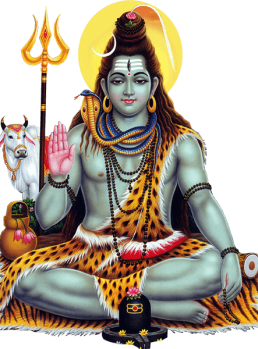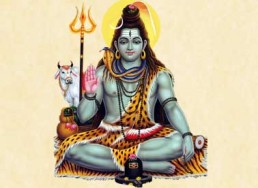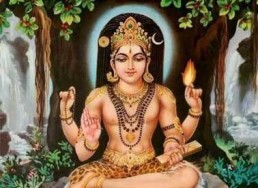Shiva Manasa Puja
जातीचम्पकबिल्वपत्ररचितं पुष्पं च धूपं तथा दीपं देव दयानिधे पशुपते हृत्कल्पितं गृह्यताम्॥१॥
jātīcampakabilvapatraracitaṃ puṣpaṃ ca dhūpaṃ tathā dīpaṃ deva dayānidhe paśupate hṛtkalpitaṃ gṛhyatām..1..
शाकानामयुतं जलं रुचिकरं कर्पूरखण्डोज्ज्वलं ताम्बूलं मनसा मया विरचितं भक्त्या प्रभो स्वीकुरु॥२॥
śākānāmayutaṃ jalaṃ rucikaraṃ karpūrakhaṇḍojjvalaṃ tāmbūlaṃ manasā mayā viracitaṃ bhaktyā prabho svīkuru..2..
साष्टाङ्गं प्रणतिः स्तुतिर्बहुविधा ह्येतत्समस्तं मया सङ्कल्पेन समर्पितं तव विभो पूजां गृहाण प्रभो॥३॥
sāṣṭāṅgaṃ praṇatiḥ stutirbahuvidhā hyetatsamastaṃ mayā saṅkalpena samarpitaṃ tava vibho pūjāṃ gṛhāṇa prabho..3..
सञ्चारः पदयोः प्रदक्षिणविधिः स्तोत्राणि सर्वा गिरो यद्यत्कर्म करोमि तत्तदखिलं शम्भो तवाराधनम्॥४॥
sañcāraḥ padayoḥ pradakṣiṇavidhiḥ stotrāṇi sarvā giro yadyatkarma karomi tattadakhilaṃ śambho tavārādhanam..4..
विहितमविहितं वा सर्वमेतत्क्षमस्व जय जय करुणाब्धे श्रीमहादेव शम्भो॥५॥
vihitamavihitaṃ vā sarvametatkṣamasva jaya jaya karuṇābdhe śrīmahādeva śambho..5..

Description
When performing mental worship, the important thing is that the objects can be distinctly experienced. If your mind is not paying full attention to the practice, you will note that the entire mental scene where you are practicing “mānasapūjā” (mental adoration) becomes indistinct, foggy. Thus, when you practice mental worship, we need to strive to form a distinct, sharp mental image. If we can do this, then we are performing mānasapūjā really well, and the fruits of it will come soon to our hands.
In order to better appreciate this great work by Sankaracharya, it would help to get familiar with the visual description of Lord Shiva. The following is an excerpt from the book “Shiva Manasa Puja” by Swami Tejomayananda. In there he says:
Saint Tulasidasji meditates on Lord Siva thus:
Lord Siva is one, on whose side shines (resides) Parvati; who carries the celestial Ganga on his head; on whose brow rests the crescent moon; whose throat holds poison; and whose chest is adorned with a huge serpent; and His body smeared with ashes; who is great amongst the deities, the Lord of all; the destroyer of the universe; the Omnipresent Siva, who, like the moon is pleasant and auspicious. May He, ever protect me.
Śiva also means Consciousness (caitanya), peace (śāntam), purity (suci), final liberation(moksha), sacredness (pavitratā) and well-being (kalyāṇam).
Parvati, symbolizes prakṛti (matter) or māyā (the power of the Lord). When Śiva wields His māyā, He is called īśvara – the Lord of the universe.
The holy river Ganga emerges from the matted locks of Lord Siva. Ganga symbolizes knowledge and devotion. The Lord gives the highest place to knowledge and devotion. He is the very source of both. He manages to keep His head cool with the holy and icy waters of Gaiga whilst facing all circumstances!
With Mother Ganga on His head and Goddess Pārvati by His side, Lord Śiva continues to meditate. It signifies, that He has won over passion. Śiva wears the crescent moon on his head. The moon is the deity of the mind. Śiva is one, who has controlled His mind.
Siva’s neck is blue, since He swallowed the poison, that emerged from the serpent during the churning of the milky ocean. Only the brave and mighty can swallow difficulties, and withstand the viscious and poisonous brunt of circumstances without collapsing, or at least without being adversely affected. It becomes their glory. Also, He did not allow His head or heart to get poisoned or embittered. He went through the challenge with admirable fortitude and forbearance and with a smile on His face.
Snakes of all sizes and shapes serve as the ornaments of Śiva. That, which creates fear and revulsion, when it comes in contact with the Lord, becomes His glory.
One with great qualities is welcomed and respected everywhere (gunihi ganihi sahiba lahai). The Lord accepts those, who lack virtues, are dull, ignored, rejected and even considered repulsive by the world (samīcīna ko adhama aguna ālasī pālihai). So even ghosts, the physically and mentally challenged and snakes find a place with Him.
The Lord smears the ashes from the cremation ground all over His body. He has burnt to ashes the identification with the body in the fire of Self-Knowledge. Also, the final destination of the body is the cremation ground. One should remember always, that the body we pamper so much, will one day be reduced to ashes. We should, therefore, not get too attached to it, accept the changes in it without resistance and learn to age gracefully. All this, the worshipper understands, as he or she meditates on the form of the Lord.
Other Shiva Shlokams
Anayasena Maranam
O Lord Shiva, please grant me a peaceful death without pain (Anasayena Maranam), a life without any trouble or dependence on others for my basic needs (Vina Dhainyena Jeevanam) and a life filled with
Ardha Narishvara Stotram
Shri Ardhanareeshwara Stotram was composed by Sri Adi Shankara bhagavatpada. Creator and Creation are One ~ Ardhanarishwara, composite of Shiva and Shakti together in one body.
Bilvashtakam
Composed by Sri Adi Shankaracharya, the famous Bilvashtakam extols the virtues of the Bilva leaf (also spelt Vilva, Bilwa) and Lord Shiva’s love for it. The following com
Bilvashtakam 14 Verses
Note: For the original version of Bilvashtakam please click here. Composed by Sri Adi Shankaracharya,
Chandrashekhara Ashtakam
Chandrashekhara Ashtakam is a divine hymn to praise God Shiva as Chandrasekhara, the lord who is adorned with moon on his head (Chandra – moon, Sekhar – crown) and to seek refuge from untimely death.
Dakshinamurthy Stotram
Shlokams,Sankara,Shiva,Dakshinamurthy
The Dakshinamurti Stotra is a Sanskrit religious hymn to Shiva by Sri Adi Shankaracharya. It explains the metaphysics of the universe in the frame of the tradition of Advaita V
Ishvaro Guru Atmeti
Shlokams,Shiva,Dakshinamurthy,Guru,Sankara
Salutations to Lord Dakshinamurti, who is all-pervasive like space but who appears (as though) divided as Lord, Guru, and the Self.
Kalabhairava Ashtakam
Composed by Sri Adi Shankaracharya. The hymn illustrates the personality of Kala Bhairava of Kashi, the God of Death(kala). Those who study these 8 verses on Kala Bhairava, which are enticing and whic
Karacharana Kritam
O Lord, kindly forgive all the wrong acts and omissions I have committed, whether I committed them knowingly or unknowingly, with my hands, feet, words, ears, eyes, or mind. Glory to you, Mahadeva, wh
Karpura Gauram
Pure white like camphor, an incarnation of compassion, the essence of worldly existence, whose garland is the king of serpents, always dwelling inside the lotus of the heart. I bow to Shiva and Shakti together
Kasi Viswanathashtakam
Composed by Sri Adi Sankaracharya in praise of Lord Shiva. That man who reads this octet with its meaning, which sings the praise of Shiva who is the lord of Varanasi, would get knowledge, wealth, gre
Lingashtakam
The Lingashtakam is one of the most popular Ashtakams(a Stotram with 8 verses) dedicated to Lord Shiva which praises Him in the abstract "Lingam" form.
Margabandhu Stotram
This great Stotra Rathna was written by Appayya Deekshitha(1520-1593). He was one of the great interpreter of Advaitha Sidhantha after Adi Sankara. This stotra is written in praise of the Lord Margaba
Mauna Vyakhya
Shlokams,Sankara,Shiva,Dakshinamurthy
I salute Sri Dakshinamurti, who is not subject to time, who makes known the truth of Brahman through the implied meaning of words, who is surrounded by disciples who are themselves Rishis and committe
Mruthyunjayaya Rudraya
Salutation to you Mrithyunjaya, Rudra, Nilakanta, Shambhu & the lord of immortals and this great lord of all beings.
Namaste astu bhagavan
Morning prayer. From Devi Mahatmyam. The Devi Mahatmyam is a Hindu religious text describing the Goddess as the supreme power and creator of the universe. It is part of the Markandeya Purana, and esti
Nidhaye Sarvavidyanam
Shlokams,Sankara,Shiva,Dakshinamurthy
Salutations to Sri Dakshinamurti, the reservoir of knowledge (the abode of all learning), the healer of all those who suffer from the disease of samsāra, and the teacher of the whole world.
Om Namah Pranavarthaya
Shlokams,Sankara,Shiva,Dakshinamurthy
Om. Salutation to the one who is the meaning of praņava, who is in the form of pure knowledge, who is taintless and who is free from any change. To that Sri Dakshinamurti, (my) salutations.
Om Namo Bhagavate Dakshinamurthaye
Shlokams,Sankara,Shiva,Dakshinamurthy
Om. Salutations to Bhagavan Dakshinamurti. (Oh Lord) Bless me with memory, the capacity to think properly, and clarity, wisdom.
Rudra Ashtakam
The famous Rudrashtakam extols the many qualities of Shiva. This is composed by Sri Goswami Tulsidas. Rudra is considered as the fearsome manifestation of Shiva. Rudrashtakam has its origins in the Ra
Shambu Devam Sakalajagatam
I sing in praise of God Shambhu, the Lord of all worlds, and the three-eyed one; the consort of Gauri, the grantor of happiness, blessings and gifts, the one with the moon as his crest-jewel.
Shambu Stuti
A stuti on lord Shiva composed by lord Rama himself. Lord Rama recites this at Rameshwaram when faced with the near impossibility of crossing the vast ocean to reach Lanka, he prayed intensly to Lord
Shiva Aparadha Kshamapana Stotram
Composed by Sri Adi Shankaracharya. The theme of this storam is of total surrender to Lord Shiva and asking for His forgiveness.
Shiva Ashtakam
Composed by Adi Shankaracharya. This ashtakam is a descriptive salutation of the different attributes of Shiva. The great yogi who is referred to as Ardhanarishwara (the one who has included the femin
Shiva Mahimna Stotram
The Shiva Mahimna Stotra is very popular among the devotees of Lord Shiva and is considered one of the best among all Stotras (or Stutis) offered to Lord Shiva. The legend abou
Shiva Panchakshara Stotram
The famous Shiva Panchakshara Stotram praises Shiva and the power of the five sacred syllables, na-ma-shi-va-ya.
Shiva Pratah Smaranam
This is a short and beautiful 'Three Shloka Prayer' that makes the start of the day full of energy and happiness. Composed by Sri Adi Shankaracharya.
Shiva Shadakshara Stotram
In this Hexa-Syllabic Hymn, there is a single stanza mantra for each letter of Aum-Na-Ma-Shi-Va-Ya. This mantra is found in Rudrayamala Tantra text.
Shiva Tandava Stotram
Shiva Tandava Stotram is the most popular Shiva Stotram composed by Ravana, King of Lanka. He was a scholar in Navavyakarana (the 9 types of Sanskrit grammar) and a great devotee of Lord Shiva. Shiva
Tatpurushaya Vidmahe Rudra Gayatri Mantra
Om. May we know that Lord Isvara, for which may we meditate upon Mahadeva. May that Rudra impel us (towards him).
Tryambakam Yajamahe
We worship Lord Shiva the three-eyed one, the one who is the master of all senses and qualities and the one who is the sustainer of all growth. May he release us from the bondage of death, just as a r
Vagarthaviva Sampruktau
Kalidasa prays to the divine parents Paarvathi & Parameshwara who are inseparable like the word and its meaning, in order to guide him in acquiring the power of words and their meanings (literature) as he embarks on the Mahakavya, Raghuvamsa.
Vande Shambu Umapatim
I salute Shambu, Umapati, the preceptor (teacher) of devas, I salute the cause of the earth, I salute the one ornamented with the serpent, the wearer of the moon, I respect that master of all beings.
Vedasara Shiva Stava
Composed by Sri Adi Shankaracharya in praise of Lord Shiva - the essence of vedas.
Shiva Manasa Puja – Shiva – In Sanskrit with English Transliteration, Translation and Meaning. Commentary for selected Shlokams.


